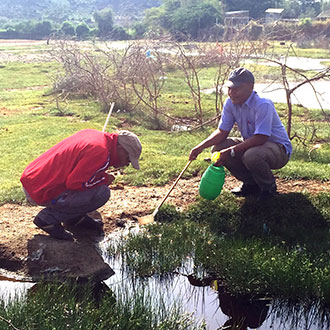
The PMI AIRS Project monitors insecticide resistance across sub-Saharan Africa to guide IRS programming. Credit: Pamela Dasher, Abt Associates Inc.
A PMI AIRS Project Study Published in the Malaria Journal Find the First Step to Managing Insecticide Resistance is Monitoring Its Spread
Since the President’s Malaria Initiative (PMI) launched in 2005, malaria control interventions across sub-Saharan Africa have scaled up dramatically. According to the World Health Organization, between 2000 and 2013, the estimated number of malaria cases in all age groups decreased from 174 million to 163 million, while the estimated malaria mortality rate in children under five decreased by 58 percent in the Africa region. Much of this progress can be attributed to indoor residual spraying (IRS) and long-lasting insecticide-treated nets, key components of PMI’s strategy, as well as national malaria control strategies across sub-Saharan Africa.
Vector resistance to insecticides is growing, threatening the impact of malaria control strategies and the spread of the disease. Extensive use of insecticides in agriculture and the scale-up of insecticide-based malaria vector control during the past decade appear to have played a pivotal role in the emergence and rapid spread of insecticide resistance on the continent.
In Mali, the PMI Africa Indoor Residual Spraying (AIRS) Project assessed the level of insecticide resistance in Anopheles gambiae s.l. mosquito populations, the primary malaria parasite-carrying vector in the country, against four classes of insecticides recommended for IRS. The study, Characterizing the insecticide resistance of Anopheles gambiae in Mali, published in August 2015 in the Malaria Journal, shows that resistance is increasing in Anopheles gambiae s.l.to multiple insecticides, and recommends resistance management strategies based on routine resistance monitoring to inform insecticide-based malaria vector control in Mali.
Entomological monitoring and reporting are an important part of the PMI AIRS Project. The Project monitors seasonal changes in vector density and their resting habits and uses this information to maximize the impact of IRS. In addition, the monitoring system helps generate data on the quality of spraying and the length of time the sprayed insecticide remains effective. The Project collects baseline entomological data on vector density, longevity, and behavior prior to the start of spraying in all PMI AIRS countries, from both intervention and comparable control villages. Then, data are collected monthly after spraying to assess the impact of IRS. An insecticide resistance test is conducted after every spray round to monitor change in the status of vectors and inform selection of insecticides for the following year.
This story was taken from www.africairs.net.
